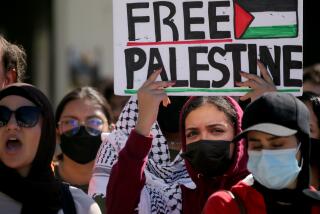Court Extends Rights Laws to Protect Jews and Arabs
- Share via
WASHINGTON — The Supreme Court, significantly expanding the scope of civil rights legislation, ruled today that federal civil rights laws aimed primarily at helping blacks may also protect Jews and Arabs against discrimination.
The court, in two unanimous decisions, in effect said that race may involve more than skin pigment.
In one case, the court cleared the way for a suit by an Arab who said he was denied tenure on a Pennsylvania college faculty because of racial discrimination.
In the second case, the court reinstated a suit by a Jewish congregation in Silver Spring, Md., against vandals who defaced a synagogue with anti-Semitic and Nazi-type slogans and symbols.
Not Restricted to Blacks
Justice Byron R. White, writing for the court, said a post-Civil War law designed primarily to protect blacks also was designed to help other ethnic groups.
“We have little trouble in concluding that Congress intended to protect from discrimination identifiable classes of persons who are subjected to intentional discrimination solely because of their ancestry or ethnic characteristics,” he said.
“Such discrimination is racial discrimination that Congress intended (the law) to forbid, whether or not it would be classified as racial in terms of modern scientific theory,” he said.
White said, moreover, that an Arab or a Jew may be subject to discrimination even if he or she does not have a distinct ethnic appearance.
“A distinctive physiognomy is not essential to qualify” for protection under the civil rights law, he said. For example, White said, discrimination may be based on the fact that someone is born an Arab.
White said that while Arabs and Jews today are considered members of the Caucasian race, they are entitled to legal protection because they were considered to be distinct races at the time the legislation was enacted.
In the Arab case, Majid Ghaidan Khazraji had been an associate professor at St. Francis College of Loretto, Pa., for more than five years when he was denied tenure in 1978.
A U.S. citizen born in Iraq, Khazraji sued the college for alleged discrimination under the Civil Rights Acts of 1964 and 1866. He said the college improperly considered his ethnic background as an Arab and his religion, Muslim.
A federal judge threw out his suit. But the U.S. 3rd Circuit Court of Appeals reinstated the case last year.
In the second case, members of the Shaare Tefila Congregation in Silver Spring invoked the civil rights laws to sue those who spray-painted their synagogue in November, 1982, with anti-Semitic and Nazi-type slogans and symbols.
Jews Not Counted as Race
The congregation sued eight men in 1984. But the U.S. 4th Circuit Court of Appeals threw out the case last year on grounds that Jews do not constitute a separate race. Today’s court action reinstated the suit.
In other action, the court:
--Said accused murderers are always entitled to new sentencing trials if a potential juror wrongly is disqualified for voicing general qualms about capital punishment.
--Ruled that families of military personnel killed on duty may not sue allegedly negligent federal employees who took part in the military mission.
--Let stand a decision allowing a state to shut down church schools that, for religious reasons, refuse to hire only state-licensed teachers.
Other rulings on Page 2.
More to Read
Sign up for Essential California
The most important California stories and recommendations in your inbox every morning.
You may occasionally receive promotional content from the Los Angeles Times.









